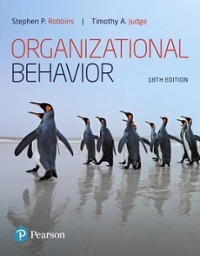Being lazy is often a quality that is shunned or looked down on in the workplace. When
Question:
Being lazy is often a quality that is shunned or looked down on in the workplace. When someone is unwilling to put energy into their work, they are, essentially, not engaged with their job. It is still unclear whether someone can have a “lazy” personality, but we can all most likely recall times when we did not want to or commit to putting forth the energy needed to do our work. In many cases, this leads to procrastination or excessive delegation, resulting in a failure to meet tight deadlines. One laziness behavior includes fleeing the scene when one does not want to work; another one is playing the victim and making excuses to make up for a lack of effort.
Although there has not been much research on laziness (perhaps anyone who has attempted to has not been able to muster the effort!), the research that does exist suggests that trait attributions of laziness are complex. For example, people tend to acknowledge that they have more personality traits than others (e.g., “I am a very complex, multifaceted person”). Although someone would not hesitate to say that they are “very energetic,” people tend to qualify laziness with “diminutive” words (e.g., “I am a little bit lazy”). Similar peculiar effects emerge when considering others’ attributions as well. Even though halo biases (see Chapter 6) can emerge for positive attributions of others (e.g., “She could have easily lied to me about accidentally giving an extra twenty dollars in change back to the customer when she first started working here. She is a fantastic, industrious, and honest person!”), horns biases do not occur as broadly as these positive traits when considering laziness (e.g., a supervisor witnessing an employee lying when she first started working there may think that she will lie in many circumstances but will not see this person as lazy).
Even more worrisome, laziness can subtly escalate or catch on with others. For instance, one lazy behavior can lead to another, and sunk costs can add up to the point where you reason you will simply start over tomorrow. Recent research suggests that laziness can be contagious—participants, unaware of their shifts toward laziness, start to endorse the same lazy behaviors and decisions that fictional, computer-generated participants made. The implications here are very intriguing: “[F]or example, if your lazy boss rewards you for having invested more effort in your work, will you become more or less lazy?”
Questions
1. Do you consider laziness to be more of a personality trait or more of a motivational state that we experience from time to time? Why? Is there a potential that it could be a little bit of both?
2. Do you agree or disagree with Michael Lewis that there is an upside to laziness? Why or why not?
3. How do you think managers and organizations can “manage laziness” so that the negative effects are minimized and the positive effects maximized? What sorts of programs and initiatives could an organization implement to achieve these goals?
Step by Step Answer:

Organizational Behavior
ISBN: 9780134729329
18th Edition
Authors: Stephen RobbinsTimothy JudgeTimothy Judge, Timothy Judge





